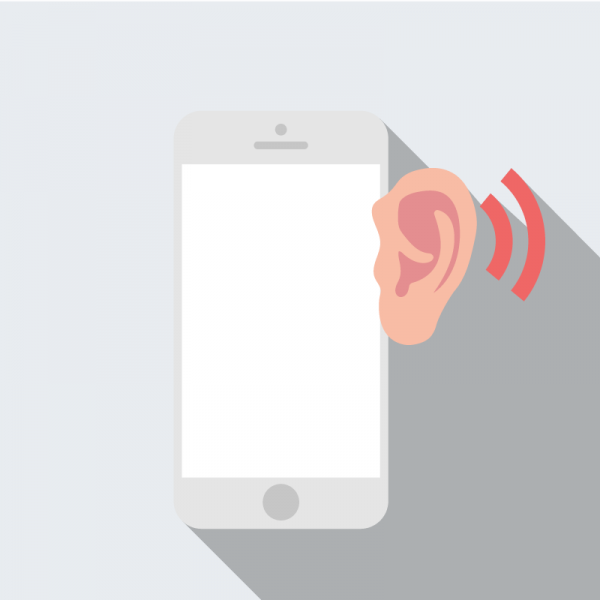Are social media listening to you?

So, earlier today, I was telling my housemate that I didn’t know what my next blog post would be about, and he told me that he was talking to my other flatmate about smartphone listening to you, and that it might be a great topic. So, here I am, after additional research.
But first, let me tell you a quick story! Yeah I know, this week is all about storytelling.
So 2 years ago, I was at a party and was sipping a fresh new drink (it was some type of sparkling vodka with flavor but just a few calories) and I had no idea what it was and my best friend was telling me how amazing it was and mentioning the brand. I went to the restroom and when I returned, I checked my phone, and since I was a 21-year-old student, I obviously checked Instagram, and one of the advertisements was for the drink I had but wasn’t aware of. As a result, my friends and I began to wonder if my smartphone was listening in on us.
And I don’t think I’d be surprised if it did. My smartwatch listens to me because it recognizes when I am washing my hands based on the sounds in my environment.
So, is your smartphone listening to you?
It’s a concern that has been directly addressed to social media executives such as Mark Zuckerberg and he has repeatedly denied that his applications are ‘listening’ to consumers using smartphones. The majority of industry professionals believe they are speaking the truth because for starters, it would be unlawful and also when you think about it, the mechanics of listening carefully to just don’t make logical sense.
So, if social media aren’t listening, how do our conversations turn into ads? Social media are in certain ways, eavesdropping but not in the sense we assume. We see digital advertising after discussing something because social media follow our every move, both online and offline.
Let’s take an easy instance to understand the phenomenon. Let’s assume you’re at a party (like the one I mentioned earlier) and your best friend tells you about this new drink he tried and liked, which we’ll name ‘Drink Me’. You’ve never talked about Drink Me before. You’ve never Googled Drink Me because you’ve never heard of it. You and your friend just have a discussion about it and then you get home and look through your Instagram feed, and… there’s an ad for Drink Me.
So, no, Instagram did not listen to your discussion.
It’s simply that it’s so effective at following you in other ways that it may give the impression. We are all aware that social media monitors our online activities. Tracking technologies have a direct impact on the advertisements we view.
We may thank location tracking. Instagram can track the position of our phones even when we are not signed in to the service.
As a result, it was able to identify that you and your friend were at the same party. If the friend has already interacted with Drink Me online, then this is your connection. Instagram is aware that you were together and if your friend is bringing up Drink Me, it’s probable that he has recently interacted with it (Googling it, visiting the website…).
Even if your friend had just discussed Drink Me with another friend, he might have been the one who received the ad prior to discussing it with you. That is sufficient for Instagram to test the ad with you as well.
As a result, every action you take online feeds algorithms. This includes responding to a post, liking someone’s photo, and even utilizing your Facebook account to check in to another online site. In essence, a sophisticated algorithm is ‘listening’ to us, but without the use of microphones.
What can you do?
To reduce this problem, there are restrictions you may explore with to control how social media tracks and uses your information. Nevertheless, the only real method to avoid being subjected to social network marketing tactics is to quit using them entirely.
References:
Erika Chin, Measuring user confidence in smartphone security and privacy (2012), https://dl.acm.org/doi/abs/10.1145/2335356.2335358?casa_token=m2mzCp1QPIsAAAAA%3AFdgtd9xWw4USeGRm87JLO1DRO_FxIAsz3Pr8N-kz8RzE37jPpiQnq7kl0DT83YywYR64K5OBpnYx3A
Guilia Bonomi, Facebook: through targeted advertising and Cambridge analytica scandal (2020)
McNutt & Partners, Why We See Digital Ads After Talking About Something (2021), https://www.mcnuttpartners.com/why-we-see-digital-ads-after-talking-about-something/
Tae Rang Choi, Instagram versus Snapchat: Self-expression and privacy concern on social media (2018), https://www.sciencedirect.com/science/article/pii/S0736585318306841?casa_token=Pgk3CchdWtEAAAAA:4l1nEJZUxcmPsVLf1FT1jNMDywV0QzVpBFyD2lVGZTUeaPpFhljIs2gNh5noSA_Oy2riS_wgMio
